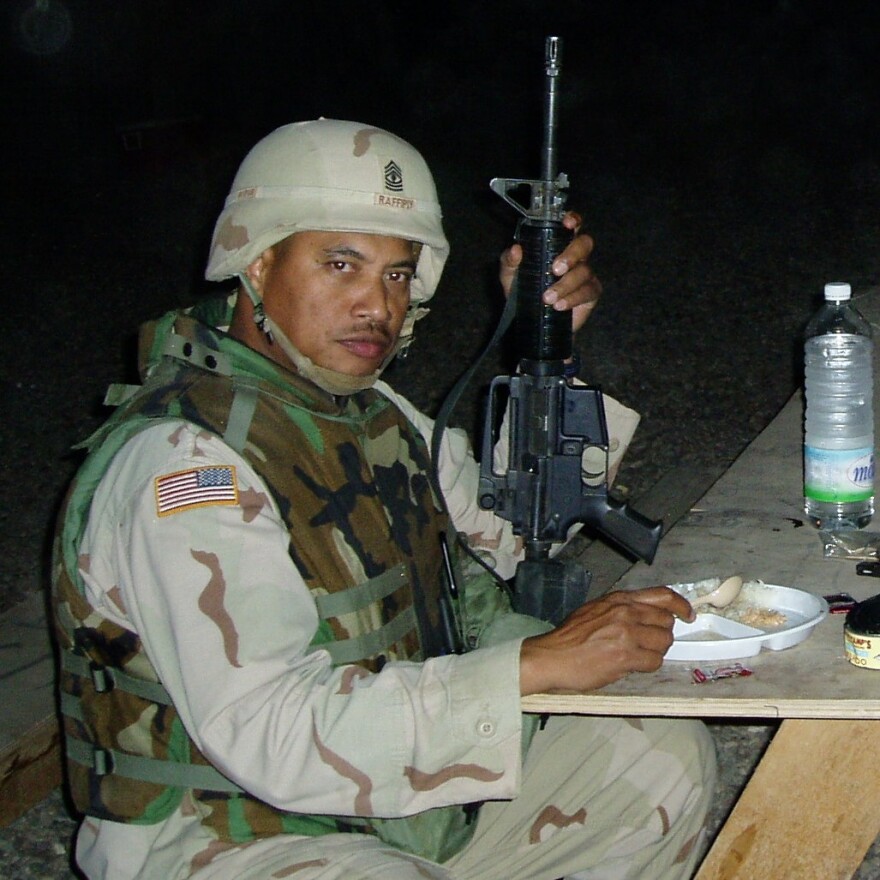Thomas Raffipiy planned to retire with his wife in Yap after serving more than 30 years in the U.S. Army. But accessing his medication at his island home is nonexistent.

The Yapese veteran has been living on Hawai'i Island to receive medical services through the Department of Veterans Affairs. Raffipiy said he'll be on medication for the rest of his life.
"If I go home, it's a suicide. It shouldn't have to be that way," Raffipiy said. "The VA was created to help veterans live a normal life or as normal as it can be. Well, it's not normal for me to live here. You become a hostage to your own conscience because my plan was to go home, fish and enjoy life. But I am still stuck here."
Raffipiy is one of many Micronesian veterans facing the predicament of staying in the U.S. for free healthcare or returning to the islands, where they face the challenges of accessing such services.
The cost of accessing health care
Micronesians from the Federated States of Micronesia, the Republic of the Marshall Islands and the Republic of Palau have served in the U.S. military since World War II.
There are a few hundred veterans living in the three nations, according to Gary Kunich, a spokesperson at the U.S. Department of Veteran Affairs.
The Pacific nations share a treaty with the U.S. called the Compacts of Free Association. The agreement is that Micronesians can migrate visa-free to the U.S. and its territories for education, work, healthcare and more. In exchange, the U.S. has strategic denial rights over the waters, land and airspace.
Micronesian veterans living in the COFA nations have long faced difficulties accessing free health care through the VA since foreign countries are prohibited through federal law.
Some veterans living in the freely associated states say traveling to pick up their medications is costly.
Robson Henry, a Kosraean veteran who served in the U.S. Army for over 20 years, travels from Kosrae to Hawaiʻi every three months to get his medication. It's a seven-hour flight every time.
He added that a one-way flight can cost anywhere between $1,400 and $2,000.
"A majority of our veterans don't have the means not only to travel but to find a place to live while they're here," Henry said. "You know how expensive it is."

Henry said many COFA veterans traveling from the Pacific nations to the U.S. states are not reimbursed by the VA, unlike veterans from U.S. territories such as Guam, the Commonwealth of the Northern Mariana Islands and American Samoa. The Philippines has an outpatient clinic, according to the U.S. Department of Veterans Affairs.
Hawaiʻi Sen. Brian Schatz and Alaska Sen. Lisa Murkowski have introduced a bill to expand health care to veterans living in the COFA nations.
The bill would remove restrictions on the VA, providing services to veterans living in the freely associated states by including a clinic providing telehealth or contracts with community providers, shipping medications to veterans residing in the COFA nations, and reimbursing veterans for traveling from their home countries to the U.S. for essential services.
Hawaiʻi Sen. Mazie Hirono and Arkansas Sen. John Boozeman co-sponsored the legislation. U.S. Representatives are introducing companion legislation.
"This is a matter of basic fairness," Schatz told HPR earlier this month. "Veterans who live in freely associated states in the Pacific have served our country, and they deserve VA care."
Schatz said that the legislation might be in a better position to become law, adding that he's been working with the U.S. Secretary Denis McDonough, the Biden administration and Ambassador Joseph Yun, who is negotiating the compacts.
"We have a little bit of momentum on our side," Schatz said. "The island nations are pushing for this. The VA seems to be on its way to a good decision... So we're not there yet, but we're somewhat hopeful that we will resolve this on behalf of our COFA veterans."
The VA declined to comment on the legislation, but Kunich said in an email that the “VA continues to work with Congress and our partner governments to ensure that FAS veterans continue to have access to these programs to the fullest extent.”
“While we are not able to provide direct care, FAS (freely associated states) veterans are eligible to be compensated for care related to service-connected disabilities as part of the Foreign Medical Program,” Kunich said in an email. “FMP reimburses veterans for service-connected hospital and outpatient care received while they are outside the U.S., without regard to their citizenship."
Decades of advocacy
Veterans and advocates say the issue is long overdue.
"It's a human right," said Kalani Kaneko, a Marshall Islands senator who served over 20 years in the U.S. Army.
Kaneko said veterans have raised concerns since the 1990s but noted that "not many veterans were facing issues like, for example, PTSD."
"Now we have more and more veterans coming home," Kaneko said. "When they come home, it's not just the immediate family dealing with it, but the entire community."
Kaneko said he and other advocates went before Congress around 2016 to present the issues. They even invited the U.S. Secretary of Veterans Affairs to visit the Marshall Islands in person in 2020.
"Everything was promising as far as change that led up to legislation," Kaneko said. "But obviously... everything just went south. But now I'm starting to see things going in the direction we wanted it to go."
Nonprofits serving the Micronesian communities have raised concerns with state and federal lawmakers.
David Anitok of COFA Alliance National Network said many COFA veterans are also facing the dilemma of going home or staying on the mainland. He added many COFA veterans are in Texas.
"We've been telling our stories, and there haven't been as many people listening as today," Anitok said. "We enlist our best men and women. When I talk story with them, they say they enlist because of their loyalty to serving their beloved countries — the Micronesian islands and the U.S."

The documentary "Island Soldier" illustrated Micronesians enlisting in the U.S. military and fighting wars. Nathan Fitch, the film's director and producer, said activism has been occurring in the islands for years.
"The COFA soldiers are also connected to a bigger story about health inequity for the COFA community in general. Even when they stay in the U.S., they're paying into social security, but they haven't had access until very recently to Medicaid, which you think they should."
A critical time for legislation
Veterans say they're hopeful the legislation in Congress will become law.
A similar bill introduced by Schatz in 2019 would've created a pilot program to provide hospital care and medical services to veterans in the freely associated states, but it stalled. Another bill was introduced in 2017, but it didn't gain traction.
The current legislation is critical, as the U.S. and the COFA nations are renewing their treaties.
At the senators' "Hawaiʻi on the Hill" event this year, Ambassador Joseph Yun said the new agreement would provide $6.5 billion in aid to the COFA nations over 20 years. That's about $300 million per year, he added.
The money would go toward economic assistance, education, healthcare and other budget support.

Kaneko stressed that the COFA nations are not seeking special treatment because the negotiations are happening.
"It seems like COFA nations are only important when there is a negotiation happening," he said. "And with the geopolitics that we're seeing now between the U.S. and China, that really shined a lot on the COFA nations. But it shouldn't be like this."
"With the uniqueness of our relationship, with the sacrifices that our COFA nations have put in place, now and in the past, we should have been treated much better than we've been treated all this time. Not just at the state level but at the federal level," Kaneko said.
Veterans and advocates are hopeful the legislation to expand healthcare to COFA veterans will become law.
"I'm doing this for my future generations," Henry said. "We have to start somewhere."







